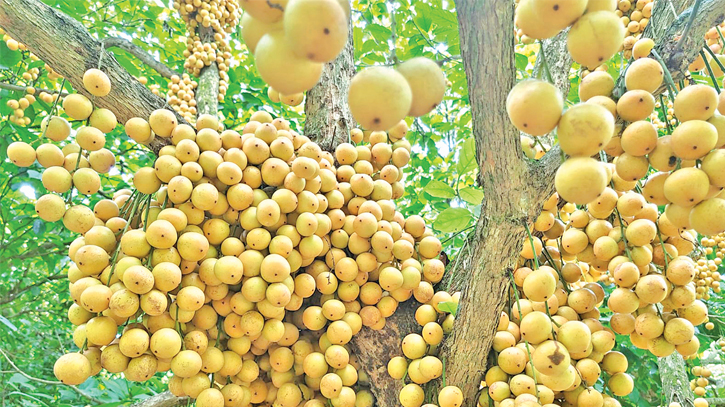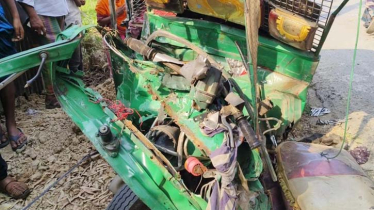
A bountiful latkan tree producing abundant fruit in Belabo Upazila of Narsingdi district. Photo: TDM
Narsingdi district has recently garnered attention for its booming cultivation of the seasonal fruit lotkon, also known as Burmese grape. The fruit has not only gained popularity locally but has also found its way into international markets, making it a lucrative venture for farmers across the region.
Just a decade ago, lotkon was not in high demand and was often referred to as 'jungle fruit,' with many not fully aware of its medicinal and nutritional properties. However, times have changed, and the commercial cultivation of lotkon has taken root in Narsingdi.
The district is currently abuzz with farmers busy cultivating and harvesting the fruit, which has witnessed a surge in demand. The lotkon buying and selling season is in full swing, with bustling markets established around the bus stand of Morjal Samata Bazar on the Dhaka-Sylhet highway.
Some of the notable lotkon buying and selling markets in the district include Morjal, Baraichha, and Chaitanya, with separate haats (temporary markets) set up in at least 20 places during the peak season. Trading activities are at their peak every day from dawn until 11 am. Wholesalers from these markets distribute the sweet and sour lotkons to various parts of the country, and the fruit has also found its way to Europe, America, and the Middle East through exports.
Officials from the Department of Agriculture Extension report that farmers are delighted with both the abundant yield and the favorable prices of lotkon this season. The estimated profit from lotkon sales for the farmers in the district this year is a staggering Tk 200 crore. Moreover, over two and a half thousand metric tons of lotkon produced in Narsingdi are being exported to various countries in Europe and the Middle East.
Traders like Dulal Mia and Md Sohail Mia from Chandpur reveal that they have been conducting business in Narsingdi during the lotkon season for over a decade. They purchase the fruit at prices ranging from Tk 60 to Tk 120 per kg and transport it to various parts of the country, including Sylhet, Sunamganj, Dhaka, and Manikganj. In their home district, Chandpur, they sell lotkon for Tk 80 to Tk 150 per kg.
The health benefits of lotkon have also contributed to its rising popularity. ANM Mizanur Rahman, supervisor of the 100-bed Narsingdi District Hospital, emphasizes that lotkon is rich in calcium, vitamin C, antioxidants, and iron. These nutrients play a vital role in addressing various health issues, including skin problems, arthritis, stomach ulcers, and mental fatigue, while also aiding in appetite stimulation.
Mosharraf Pathan, a lotkon farmer from Bateshwar village in Belabo Upazila, shares that lotkon cultivation is relatively simple and low-maintenance. Keeping the tree safe from ants, the primary enemy of lotkon, ensures a good yield. Additionally, the fruit is disease-resistant, and a single tree can bear fruit for 25 to 30 years or more.
Many farmers in the area, like Pathan, are reaping substantial profits, with him expecting to earn Tk 15 lakh from lotkon sales this year.
Azizur Rahman, the deputy director of Narsingdi Agricultural Extension Department, explains that the increasing demand in both domestic and foreign markets, coupled with low cultivation costs, has motivated most farmers to cultivate lotkon on a commercial scale. Narsingdi's brand reputation for lotkon has spread throughout the country, and it is projected that lotkon sales may reach a staggering Tk 350 crore this year.
TDM/SD








